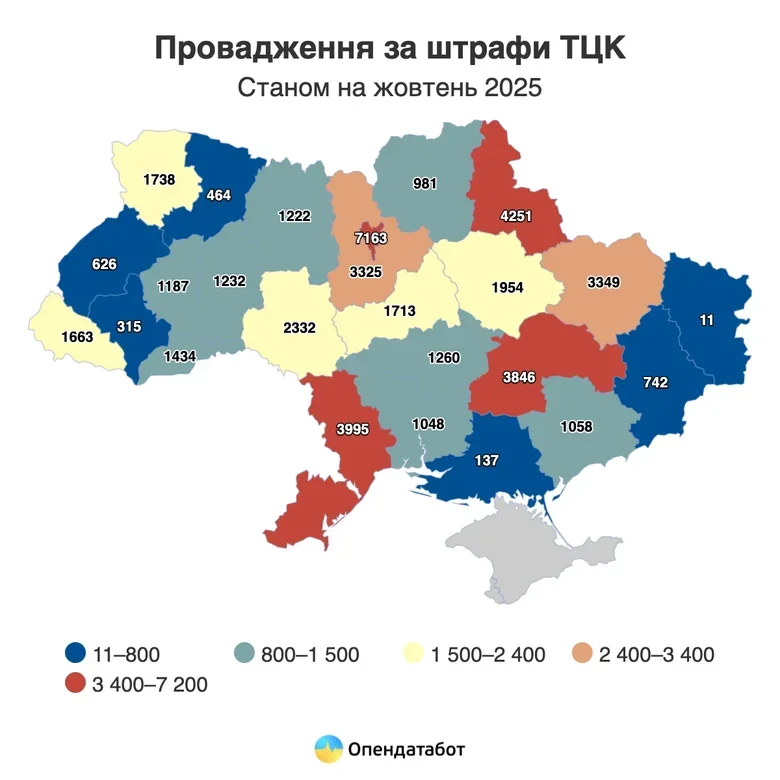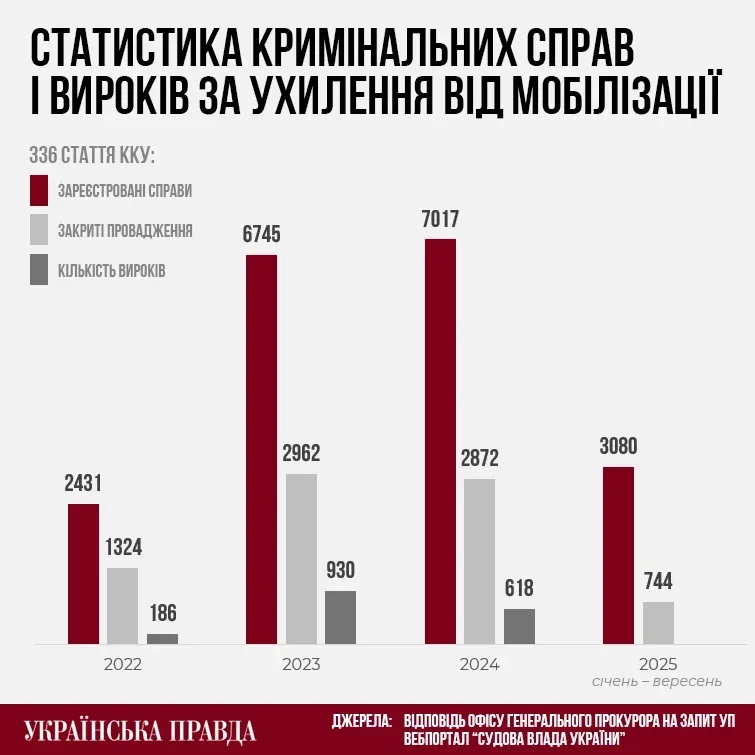19,000 cases of evading mobilisation registered: far fewer convictions, - media

In Ukraine, violators of military registration are not actually sought out, so they manage to avoid responsibility.
According to Censor.NET, this is stated in an article by UP.
Search for violators of military registration
A source in the General Staff told the publication that the task of the TCR is "not to chase violators, but to keep track of current data on all persons liable for military service'.
"The TCR often mobilizes the sick and frail, because 'mobilization' plans must be closed every month. Most of these people will never be able to effectively perform combat tasks. At the same time, we have armies of AWOL and healthy "draft dodgers" walking around," says one of the brigade commanders who deals with recruits.
OpenDataBot data testify that military TCRs issued more than 47,000 fines for violations of military registration from January to October 2025. In 2024, during the same period, there were 21,000 administrative cases for violations of military registration.
Kyiv tops the anti-rating list.
One of the TCR servicemen, speaking on condition of anonymity, said: "There are many violators, and we are very few. We are not able to fine absolutely everyone who does not update their data or fails to pass the MMC. Ignoring a ‘combat’ summons is another story. We try not to let such cases slip by."
The Office of the Prosecutor General registered more than 19,000 cases of evasion of mobilisation between January 2022 and September 2025. However, the number of people convicted for this offence is significantly lower.
Data on sentences for 2025 has not yet been published.
How is it possible to avoid responsibility?
One of the men who had not updated his military registration details said that at the beginning of the summer he went on holiday to the Carpathians. At the first checkpoint, he was detained and taken to the TCR.
"I had to pay three thousand dollars just to get out of the TCR. They didn't remove me from the wanted list. They gave me no guarantee that I wouldn't be stopped at another checkpoint. I had to drive home across half of Ukraine through the fields," he said.
Legal methods of evasion
Anton Muraveinyk, head of the "Come Back Alive" analytical department, says that some are looking for jobs with official reservations, getting jobs as civilian workers in the Armed Forces, or enrolling in university.
"There are also companies in the regions that have 'unofficial' reservations. They have agreed with their district military registration and enlistment offices not to touch them," he added.
According to Muraveinyk, it is not profitable for employers and regional officials to promote mobilisation. Companies use legal or illegal means to keep their employees in the shadows to avoid losing scarce labour.
Improving mobilisation
Iryna Friz, a member of the Rada's defence committee, believes that a "motivation package" should be created for recruits. For example, discounts on mortgages and loans for starting a business, increased bonuses for destroying Russian equipment on the battlefield, and one-off payments for contract soldiers.
"Incidentally, a bill listing additional payments for recruits and active military personnel has been pending in the Rada for almost two years because the Cabinet of Ministers cannot find the money for it," the publication writes.
According to Friz, setting clear terms of service during martial law would be a "key marker" for both current military personnel and those who are going to be mobilised.
On 3 November 2025, Defence Minister Denys Shmyhal announced that the Ministry of Defence had begun preparing new types of contracts. The main "innovation" is the establishment of clear terms of service. For contracts lasting 2–5 years, there will be a one-year deferral from mobilisation after completion of service.
"In case you forgot, the Ministry of Defence had promised to develop legislative changes on clear terms of service in 2023, 2024, and 2025. But time and again, the military leadership opposed this. The General Staff explained its position by saying that if a large number of experienced military personnel were discharged from service without replacing them with new recruits, commanders would have to withdraw their forces from the front lines. Whether the Ministry of Defence will be able to implement its idea this time remains to be seen," the article says.


